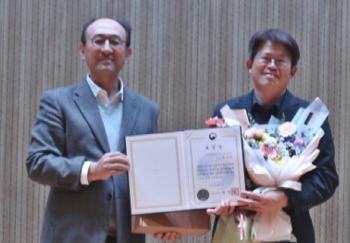MET gene targeted therapy, anti-cancer effects are great...Beyond non-small cell lung cancer, colon cancer and gastric cancer are also applied
Gene-targeted treatment for solid cancers such as lung cancer and stomach cancer was identified as the key.
On the 30th, a research team led by Professor Cho Byung-chul and Professor Lee Ki-beop of Oncology Department at Yonsei Cancer Hospital and Professor Shim Joo-sung suggested the possibility of expanding the strategy of targeted treatment of excessively expressed MET genes to various carcinomas beyond non-small cell lung cancer (NSCLC).
The findings are published in the world-renowned journal Oncology 'Nature Reviews Clinical Oncology (IF 82.2).
MET genes are involved in the growth and metastasis of cancer cells. In the clinical field, the anticancer effect was confirmed to be great when the gene was targeted for non-small cell lung cancer patients with excessively expressed MET genes, and it has become a major target in the treatment of non-small cell lung cancer.
The research team confirmed the possibility of expanding this MET gene-targeted treatment strategy not only to lung cancer but also to other solid cancers. This is because MET gene abnormalities are also found in colon cancer and stomach cancer, and targeted treatment is possible. If the MET gene is overexpressed early and the timing of treatment is adjusted, the anticancer effect can be maximized.
In fact, in addition to the use of MET gene inhibitors alone in various solid cancers, research on combination therapy with immuno-oncology drugs or antibody drug conjugates (ADC) is actively underway.
In addition, the research team also confirmed the effect of MET gene-targeted treatment as a supplement to resistance seen by the human body against EGFR inhibitors. EGFR is a gene that causes cancer when expressed in excess.
If the human body shows resistance to EGFR inhibitors used in solid cancer patients such as non-small cell lung cancer and colon cancer, the MET gene is excessively expressed.
Professor Cho Byung-chul confirmed that the MET gene, which has been previously targeted for chemotherapy for non-small cell lung cancer, may also be targeted in other solid cancer patients such as colon cancer and stomach cancer"In particular, resistance to EGFR inhibitors widely used in chemotherapy could also be another treatment option upon overexpression of the MET gene."
On the 30th, a research team led by Professor Cho Byung-chul and Professor Lee Ki-beop of Oncology Department at Yonsei Cancer Hospital and Professor Shim Joo-sung suggested the possibility of expanding the strategy of targeted treatment of excessively expressed MET genes to various carcinomas beyond non-small cell lung cancer (NSCLC).
The findings are published in the world-renowned journal Oncology 'Nature Reviews Clinical Oncology (IF 82.2).
MET genes are involved in the growth and metastasis of cancer cells. In the clinical field, the anticancer effect was confirmed to be great when the gene was targeted for non-small cell lung cancer patients with excessively expressed MET genes, and it has become a major target in the treatment of non-small cell lung cancer.
The research team confirmed the possibility of expanding this MET gene-targeted treatment strategy not only to lung cancer but also to other solid cancers. This is because MET gene abnormalities are also found in colon cancer and stomach cancer, and targeted treatment is possible. If the MET gene is overexpressed early and the timing of treatment is adjusted, the anticancer effect can be maximized.
In fact, in addition to the use of MET gene inhibitors alone in various solid cancers, research on combination therapy with immuno-oncology drugs or antibody drug conjugates (ADC) is actively underway.
In addition, the research team also confirmed the effect of MET gene-targeted treatment as a supplement to resistance seen by the human body against EGFR inhibitors. EGFR is a gene that causes cancer when expressed in excess.
If the human body shows resistance to EGFR inhibitors used in solid cancer patients such as non-small cell lung cancer and colon cancer, the MET gene is excessively expressed.
Professor Cho Byung-chul confirmed that the MET gene, which has been previously targeted for chemotherapy for non-small cell lung cancer, may also be targeted in other solid cancer patients such as colon cancer and stomach cancer"In particular, resistance to EGFR inhibitors widely used in chemotherapy could also be another treatment option upon overexpression of the MET gene."
|
This article was translated by Naver AI translator.




